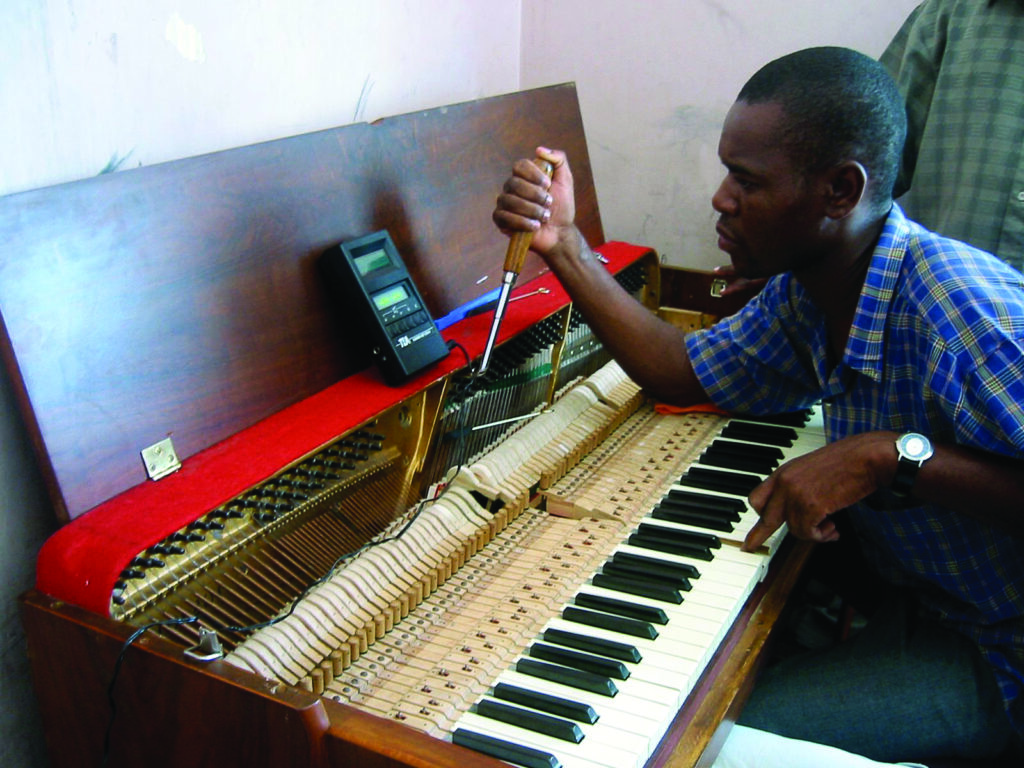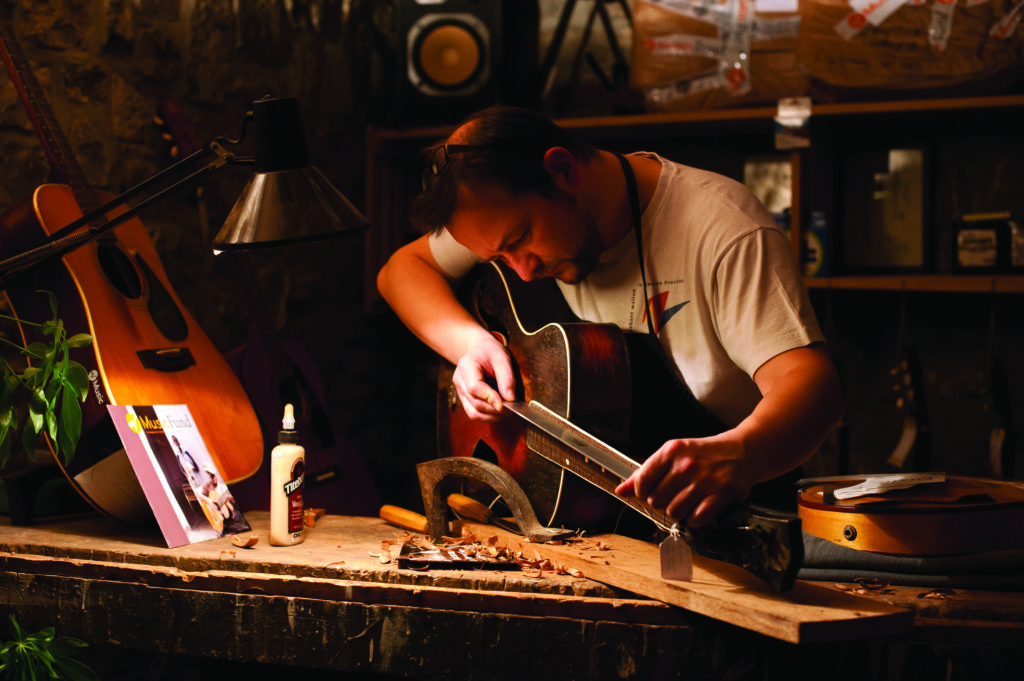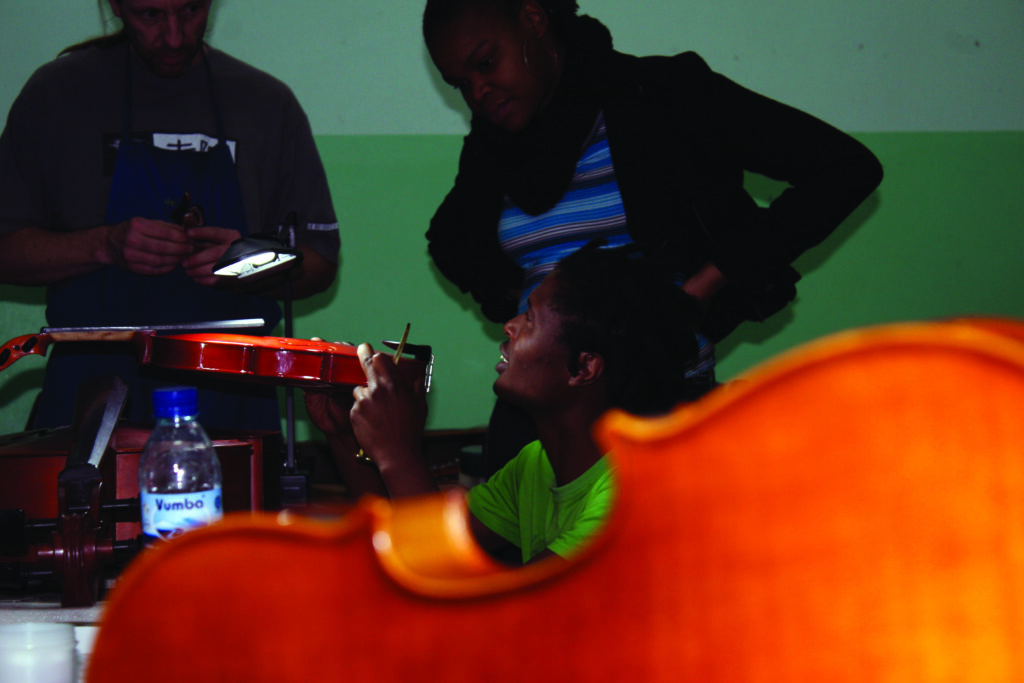Give Music a Chance
Most of us recycle our glass, paper and plastic, or at least we try… Some of us give our clothes to charities for those in greater need and to decrease the waste of our products. But how many of us have ever thought to offer a new life to a musical instrument? This is what the Belgian non-profit Music Fund is doing: collecting musical instruments, repairing them and then offering them to music organizations in Belgium, in conflict zones and in various developing countries.
Music Fund was the result of a collaboration between Oxfam Solidarity and Ictus – a Brussels-based contemporary music ensemble. Since 2002, Ictus has been regularly sending musicians to reinforce music schools in Palestine, Israel and Mozambique. While on mission in Palestine, Lukas Pairon, manager of Ictus, became aware of the difficult conditions in which the musicians there worked and the dire need for them to have access to more musical instruments.
From this, the idea of organizing campaigns to collect instruments emerged. In 2005, up to 500 instruments of all kinds were received with the support of Oxfam Solidarity. The first shipment to Palestine and Israel took place at the end of the year, distributed by lorries bearing the slogan “Give Music a Chance”.
Other shipments to the Middle East and Africa soon followed. The organizers, however, wanted to go a step further. They decided to set up training programs for musical instrument repair technicians, thereby giving partner organizations the ability to maintain the instruments themselves.
Since then, the Music Fund has grown and now boasts two full-time employees and a large number of part-time and voluntary workers in Belgium and abroad. The work is led by an administrative team in Brussels, a workshop in Marche-en-Famenne, Belgium, where the instruments are repaired and an instrument storage place in Jemelle, Belgium.
The organization’s fantastic work is widely recognized and in 2010 the European Commission selected it as demonstrating “Best Practice in Culture and Development”.



The Music Fund Achievements
Since its inception, Music Fund has:
- Collected 6,000 musical instruments
- Fixed and donated 3,000 musical instruments
- Partnered 13 organizations in Palestine, Israel, Mozambique, DR Congo, Morocco and Haiti
- Trained 16 instrument repair technicians
- Supported 9 permanent repair workshops within partner organizations
- Created 18 collection centers in 6 European countries
Interview with Christian Bertram, Coordinator of the Music Fund
Christian Bertram. Photo: Romain Robert

Do you collect all kinds of musical instruments?
At the beginning, we received all types of instruments, but most often we are given guitars and violins probably because they are the ones most played by children.
Our projects in southern countries sometimes ask for rare instruments, which are difficult for us to find. We are very interested in receiving oboes, bassoons, all kind of brass and wind instruments, double bass, viola, cello, drums and electric(tronic) instruments.
We refuse eight out of 10 pianos because they are too fragile, too old or need too much work, especially given the cost of sending them to countries such as Haiti, the Democratic Republic of Congo, or Palestine.
How does a project work?
A typical Music Fund project starts with an investigation year during which we search for the best partner, for instance a music school, a cultural center or a social project. We then deliver around 100 to 300 instruments. We send in experts for a couple of years to repair the instruments and train students of the school/center/project to maintain the instruments. The last step is to find the money to offer the best students intensive training for 3-6 months. We offer training in four disciplines: guitar, violin and wind repair, and piano-tuning.
Christian Bertram
Music affects people in a positive way; it helps them to forget the conditions of their life and allows their mind to enter a parallel world. Music is good for everyone.
Can you tell us about a favorite project in a developing country?
The last project in the Democratic Republic of Congo took place in the small town of Bukavu and it was fantastic! The Music Fund has been present in the country since 2007 and after a long period working in Kinshasa, we decided to move to the East of Congo and to help a very small project called “Ndaro Culture”.
I am a guitar-marker and in August I went to Bukavu to give a guitar repair course to seven students. At the same time, Mando Lyve Mengi, a young student who we had trained in Kinshasa in 2014-2016, came to give his first training in his own country.
This is exactly what we hope will happen everywhere: that our students take over and we can leave a project in good hands.

What projects are you leading in Belgium?
I manage a project in the prison of Marche-en-Famenne. We first sent instruments there in 2014, I gave guitar repair training to the inmates in 2015, a ukulele-making training in 2016, and in 2017 and 2018 a complete guitar-making training to six prisoners.
Music affects people in a positive way; it helps them to forget the conditions of their life and allows their mind to enter a parallel world. Music is good for everyone.
How can I get involved?
We have lot of drop off points in Belgium where you can leave instruments. You can also come and meet us at our family-friendly music festival “Give Music a Chance” that will take place on 26 May at the Scandinavian School in Waterloo, Belgium. Last year’s event brought together over 600 people and raised funds for two projects run by the Hedda Foundation (a Norwegian non-profit), in Vietnam and Myanmar. This year we hope to welcome 2,000 to 3,000 people, with proceeds going to support our work in the Congo and elsewhere!
To find out more: